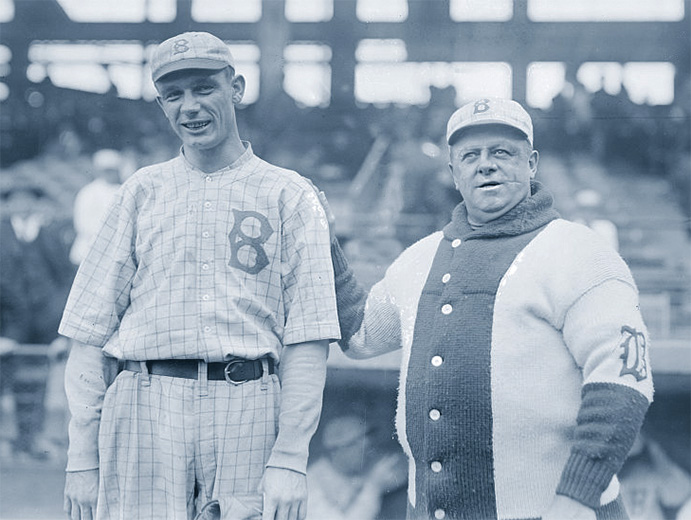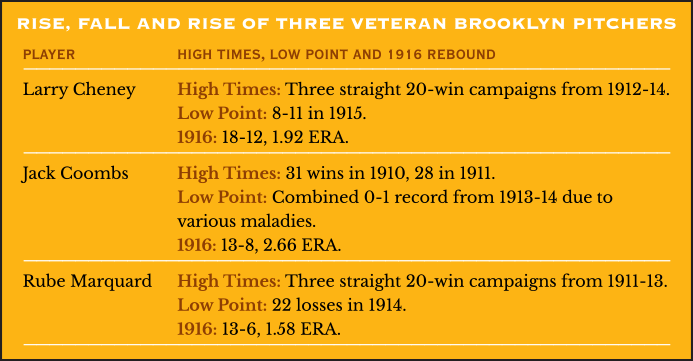THE YEARLY READER
1916: A Test of Robins
Successfully building up a franchise long stuck in the second division, Brooklyn manager Wilbert Robinson steadily flies his Robins to a rare National League pennant.

Brooklyn manager Wilbert Robinson stands proudly next to pitcher Rube Marquard, one of the Robins’ many reclamation projects who turned into pennant gold in 1916. (Library of Congress)
John McGraw and Wilbert Robinson were once the best of friends.
The two had been playing partners on the great Baltimore Orioles teams of the 1890s, and Robinson had been the Little Napoleon’s right-hand man afterward, occasionally serving as his assistant coach.
But shortly after the Giants lost their third consecutive World Series in 1913, the quick-tempered manager began to take out his frustrations on the jolly, portly Robinson, accusing him of bungling his job as a base coach throughout the year. When McGraw got especially abusive towards Robinson at an Orioles reunion party, Robinson finally responded by dumping a beer on McGraw’s head.
End of friendship.
The blow-up quickly took an intriguing turn when Brooklyn owner Charles Ebbets hired Robinson as his new manager, placing the 52-year-old former catcher on an equal level with McGraw.
The New York-Brooklyn rivalry was once based solely on proximity. But with two sudden enemies now staring at each other from opposing dugouts, it now became personal as well.
Unlike McGraw’s perennially strong Giants, the team Robinson inherited at Brooklyn was a mess. It had suffered through 10 straight losing seasons, commanding few fans and press attention in New York’s saturated baseball market.
Slowly yet surely, Robinson began to right the momentum of the franchise. After a relatively competitive 75-79 record in 1914, the Robins—as they were renamed in the new manager’s honor—finally escaped the second division in 1915 with a third-place finish.
As the 1916 season opened, many believed the Robins—who stayed relatively pat during the offseason—would recede towards the back of the pack against improved National League competition. But the chemistry of talent within the Brooklyn roster was starting to gel into the personality of a serious contender. Its lineup featured outfielder Zack Wheat and first baseman Jake Daubert, both sharp hitters reaching their prime, and a zany 25-year-old outfielder with another reliable bat: Casey Stengel. On the mound, solid workhorse Jeff Pfeffer was accompanied by three veteran castoffs—Larry Cheney, Rube Marquard and Jack Coombs—all of whom showed they had plenty of major league mileage left in their once disregarded arms.
Breaking out the new year in mesmerizing checkered uniforms, the Robins sprinted out to first place and stayed at the top of the league, fighting off repeated challenges from the Boston Braves and Philadelphia Phillies, the NL’s two previous champions. The three-way race would carry into October.
BTW: The Robins’ cross-hatched uniforms would be discarded after one year.
It was hard enough for John McGraw to watch his former assistant, partner and friend emerge in prime position to conquer the pennant. But he had bigger problems of his own, trying to steer a Giants team outrageously careening from one extreme to the other.
New York badly tumbled out of the gate at 2-13, and when McGraw used his authority to call postponements for some early home games due to “wet grounds,” suspicious reporters scoffed that the grounds had been flooded by the tears shed by McGraw and his Giants over their horrendous start.
But when the Giants headed west for their first extended road trip of the year, they hitched onto a 17-game winning streak, bringing them back to second place—right behind Brooklyn. And just when it appeared McGraw was ready to go in for the early kill on the Robins, the Giants regressed yet again, descending into a summer of malaise.
Having given up trying to figure out his team’s schizophrenia, McGraw almost gave up on himself when he publicly considered retirement in August. He would stick it out, but not before making a quick fix. Gone by late summer were three early-season regulars, including famed veterans Larry Doyle and Fred Merkle. But most heartbreaking for Giants fans, McGraw dealt away Christy Mathewson, who had clearly lost his immortal edge over the past few years. Going to Cincinnati with Matty was young prospect and future star Edd Roush.
BTW: After winning at least 22 games per season from 1903-14, the 35-year-old Mathewson won just eight in 1915 and only three in the first half of 1916.
In return, McGraw got a dose of new talent that he hoped to quickly mold into instant winners, and it apparently did the trick. The Giants started on another long winning string in September, where in a 24-day period they would win 26 consecutive decisions—all at home. In one season, McGraw’s whip had cajoled the Giants into two of the nine longest winning streaks in the history of baseball’s modern era; the 26-game string established the major league record for the longest, ever.
BTW: The Giants had one discounted tie during the streak, as well as one rainout, washing away a 2-0 lead by the opposing Reds just an inning before the game became official…During both streaks, the Giants cleaned up on 1916’s three weakest NL teams—Pittsburgh, St. Louis and Cincinnati—finishing the year with a combined 48-17 record against them.
Ressurected Robins
For three of Brooklyn’s top pitchers—Larry Cheney, Rube Marquard and Jack Coombs—the 1916 season represented a return to grace after falling from it just a few years before. Notated below is the rise, fall and rise again of the Robins’ rebounding trio.

The massive streak had not gotten the Giants back into the pennant chase, but McGraw had one prime moment of potential satisfaction to look forward to end the season: Going to Brooklyn, playing spoilers against the Robins and ruining Wilbert Robinson’s World Series hopes.
Charged up to salvage his personal battle with Robinson, McGraw instead watched as his rampaging Giants suddenly played flat against Brooklyn. Jack Coombs first shut New York down 2-0, and then the Robins used their bats on the next day to squash the Giants, 9-6, to ice the pennant. Irate over his team’s performance, McGraw erupted; he stormed into the clubhouse during the fifth inning, not to return for the Giants’ remaining few games. He later claimed that his players were not responding to his orders; Robinson, knowing full well that McGraw had bolted via jealousy and frustration, chucked away the New York manager’s assertions as “ridiculous”—then added an unprintable request to reporters: “Tell McGraw to stop pissing on my pennant!”
Brooklyn showed impressive balance in wrapping up its first pennant in modern times, leading the NL in both batting average and earned run average. Pfeffer continued to be the ace, winning 25 and hurling better than anyone on the mortal side of Pete Alexander. Cheney chipped in with 18 wins, Marquard added 13 (against six losses) with a 1.58 ERA, and Coombs finished 13-8 after his career seemed left for dead in Connie Mack’s notorious fire sale of the year before.
The defending NL champion Phillies finished 2.5 games back, having split a series of doubleheaders with the Braves at the end of the season to cancel each team out of the pennant race. Philadelphia would have been a lot worse off had it not been for the continued exploits of Alexander, who won 33 games—16 by shutout, an all-time record.
BTW: Alexander’s 14th shutout broke the record in a game in which he defeated the Robins’ Jack Coombs—who held the old mark of 13.
When Tris Speaker’s salary for 1916 was seriously reduced to $9,000 in the monopolized, post-Federal League world, the Boston Red Sox’ batting and fielding extraordinaire wouldn’t have it. He held out all through spring training and, on the eve of Opening Day, was dealt to Cleveland by frustrated Boston management.
Okay, the optimists defended, at least the Sox still had great pitching. Well, that too appeared weakened by Speaker’s trade; veteran hurler Smoky Joe Wood, Speaker’s good friend and roommate, got so piqued by the trade that he, too, began a holdout—one which would elapse through the entire season.
All this, many believed, would put an end to Boston’s chances of repeating as American League and World Series champs.
Although the Red Sox would not put up statistical numbers befitting a powerhouse, they showed enough experience from pennant races past to grab their second straight AL flag. They did it by a scant two games over an emerging Chicago White Sox unit that, by the numbers, hit and pitched better.
The Red Sox managed despite an offense that was almost non-existent. They didn’t hit well, scored infrequently, and were hardly blessed with speed. The Sox lacked power so badly, they managed only one home run all year on their own home turf at Fenway Park. As a slight offset, what the regulars lacked at the plate they made up for in the field, representing the league’s best defense.
BTW: Overall, the Red Sox smacked just 14 homers; Tilly Walker provided the lone blast at home.
There was certainly no shortage of talent within the Boston pitching staff. Wood was effectively replaced by a young, aggressive submarine-style thrower named Carl Mays, who won 18. Dutch Leonard and Rube Foster each tossed no-hitters.
But the Red Sox’ greatest pitching effort easily came from 21-year-old Babe Ruth. His 23-11 record was the strongest on the staff, while his 1.75 ERA and nine shutouts led the league. Ironically, through 324 innings, Ruth didn’t surrender a single home run—while launching three himself in sparse opportunity at the plate.
BTW: All three of Ruth’s home runs for 1916 came in consecutive games in mid-June.
As he would do in later years with the bat, Ruth on the mound rose best to the occasion when the spotlight shined brightest. In 1916, he saved his best for the great Walter Johnson. Four times during the season, Ruth beat him in head-to-head competition—two of which were 1-0 shutouts, including a 13-inning classic on August 15.
Having won over the critics during the regular season, the Red Sox were favored to snap up the World Series from the Brooklyn Robins. They wouldn’t disappoint.
For the third year in a row, citizens of Beantown were treated to a World Series; and again, the participants would play in their neighbor’s ballpark. The Red Sox abandoned Fenway and set up Series shop once more at voluminous Braves Field, where they could take in more gate receipts.
The crucial moment in the Series came in a nerve-wracking Game Two at Boston, where Ruth and Brooklyn starter Sherry Smith pitched for their lives. Ruth gave up a solo inside-the-park home run to Hy Myers in the first inning, but made amends in the third by knocking in Everett Scott on a ground ball to tie it. The score would remain even all the way to the 14th inning—with both starters still on the mound—when the Sox finally broke through with the game-winning tally on pinch-hitter Del Gainer’s run-scoring single. It put Boston up by two games and perished the Robins to longshot status, from which they would not overcome.
Though the Robins found victory in Game Three, Red Sox pitching returned to nail down the series. For the second straight year, the clincher for Boston would be Game Five, as Ernie Shore silenced the Robins on three hits—all before a Braves Field crowd of 42,620, the largest in World Series annals to date.
In defeat, Charles Ebbets was gracious for the effort his manager of three years had done in bringing baseball credibility to Flatbush. And for that, Wilbert Robinson would receive a $5,000 bonus. Though history will best remember him as Uncle Robbie, leading his Robins through a comedy of bumbling campaigns in the 1920s and 1930s, for the moment he was revered as a leader on the order of his former pal up at the Polo Grounds.
 Forward to 1917: Clean Sox The Chicago White Sox—the team that would throw the 1919 World Series—plays it strong and honest against the New York Giants.
Forward to 1917: Clean Sox The Chicago White Sox—the team that would throw the 1919 World Series—plays it strong and honest against the New York Giants.
 Back to 1915: The Great Connie Mack Fire Sale Sensing bad vibes and bad finances, Philadelphia A’s manager Connie Mack tears apart his first dynasty.
Back to 1915: The Great Connie Mack Fire Sale Sensing bad vibes and bad finances, Philadelphia A’s manager Connie Mack tears apart his first dynasty.
 1916 Leaders & Honors Our list of baseball’s top 10 hitters and pitchers in both the American League and National League for the 1916 baseball season, as well as the awards and honors given to the game’s top achievers of the year.
1916 Leaders & Honors Our list of baseball’s top 10 hitters and pitchers in both the American League and National League for the 1916 baseball season, as well as the awards and honors given to the game’s top achievers of the year.
 The 1910s: The Feds, the Fight and the Fix The majors suffer growing pains as they deal with a fledgling third league, increased scandal and gambling problems, and a brief interruption from the Great War.
The 1910s: The Feds, the Fight and the Fix The majors suffer growing pains as they deal with a fledgling third league, increased scandal and gambling problems, and a brief interruption from the Great War.




